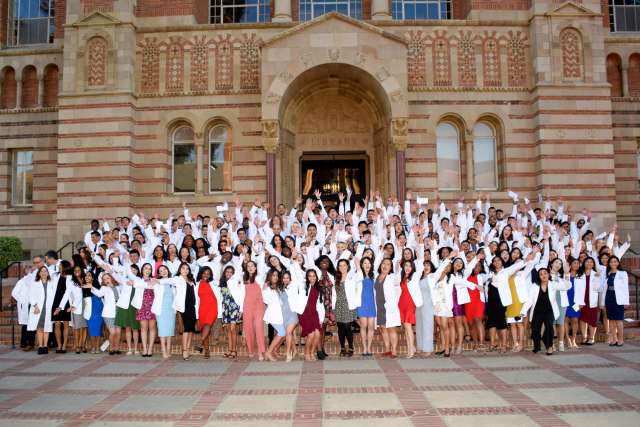SPOKE AT THE WHITE COAT CEREMONY FOR OUR SECOND-YEAR CLASS OF MEDICAL STUDENTS IN FEBRUARY. The ceremony, which had been postponed due to the COVID-19 pandemic, marks the start of the students’ journeys into clinical medicine. As each student received their white coat, the room erupted with cheers of support from their classmates and families. I was deeply moved. I shared with them that this camaraderie and enthusiasm reminded me of a quote from the iconic painter Wayne Thiebaud, who died this past Christmas Day at the age of 101: “It’s worth investing in as many deeply involved people as we can muster because I think that’s where our hopes lie: in giving us a life of pleasure, challenge, comfort, joyousness — all of the things that make us human and able to relate kindly to each other.”
I think Thiebaud is telling us that our community and our relationships with one another are at the heart of everything we do. The students — along with our faculty, staff and trainees — have navigated many challenges and uncertainties The Painter’s Prescription An artist’s words of wisdom form a foundation for building the future of the David Geffen School of Medicine at UCLA. PHOTO: GRAD IMAGES/DAVID GEFFEN SCHOOL OF MEDICINE AT UCLA during the past two years of the pandemic. Despite these challenges, our community forged ahead and continued to advance our core missions in clinical care, education, research and community engagement.
Last year we celebrated the 70th anniversary of UCLA’s charter class of medical students — 26 men and two women, taught by a faculty of 15 — and we recognize the collaborative accomplishments stemming from those earliest years and now contributing to the transformation of modern medicine. We stand at the threshold of new opportunities in education, research and patient care.
Among our highest priorities is to enhance the requisite infrastructure that reaches across disciplines, departments and UCLA’s other schools, breaking down barriers and fully integrating our mission with those of UCLA Health and the broader UCLA campus. To foster even greater collaboration across the spectrum of UCLA’s academic disciplines, the David Geffen School of Medicine at UCLA has created seven themes focused on essential research domains: cancer; cardiovascular research; health equity and translational social science; immunity, inflammation, infection and transplantation; metabolism; neuroscience; and regenerative medicine.
The team-oriented research necessary to achieve breakthroughs in these areas offers significant benefits that include funding, recognition and academic promotion, but even greater reward is within our reach. Effective collaboration unlocks opportunities to translate research into impactful therapies, taking the creative ideas of our scientists from initial concept to clinical breakthroughs for patient care. Both literally and figuratively we are breaking down the walls that divide our research laboratories, allowing us to reach our community.
The value of this approach to research is exemplified by the innovative collaborations that helped us understand the fundamental virology and immunology of SARS-CoV-2, the virus that causes COVID-19, which then led to effective diagnostics and new avenues for therapy. In other studies, school of medicine research teams partnered with the Los Angeles Unified School District to prepare an evidencebased safety plan that allowed students to return to in-person learning during the pandemic. These are two powerful examples of how team science at the David Geffen School of Medicine benefits our communities.
Two more examples further highlight our school’s community engagement and leadership. The first is the UCLA-led Community Engagement Alliance (CEAL) Against COVID-19 Disparities, a statewide collaboration among 11 academic community-partnered teams. CEAL provides reliable information about COVID-19 and has helped educate more than 120,000 people through health fairs and town halls. CEAL has trained more than 300 community health workers to share COVID-19 information and counter misinformation about the pandemic and vaccines. The second example is the Get Out the Vaccine Campaign, for which UCLA partnered with the State of California and 34 community-based organizations across Los Angeles County and the Central Valley to conduct door-to-door canvassing, text messaging and phone calls that have reached more than 7 million individuals. Through this project, more than 75,000 people have registered to receive COVID-19 vaccines, and vulnerable families have been connected to resources that provide rent relief, offer employment assistance and combat food insecurity.
As we face new challenges and build upon the work that has come before, I am honored to have been appointed interim dean of the David Geffen School of Medicine. I came to UCLA in 1988 as a pulmonary and critical-care medicine physician and cancer researcher, drawn by the school’s innovative and collaborative environment that fosters advances in research, clinical care and education. This is the magnet that first drew me to UCLA and has held me here for more than 30 years.
Our highest priority is to sustain and enhance our work together. This work draws on the power and efficiencies of effective collaboration as we continue our commitment to developing a diverse workforce and the inclusion of community input. Research into the social determinants of health and health disparities will be highly valued. We are continuing to foster an inclusive science initiative to advance racial and gender equity, diversity and inclusion throughout our enterprise. We will continue our commitment to addressing structural racism by following the anti-racism roadmap. Wayne Thiebaud’s wise words describe the cornerstone of our mission: “It’s worth investing in as many deeply involved people as we can muster.”
